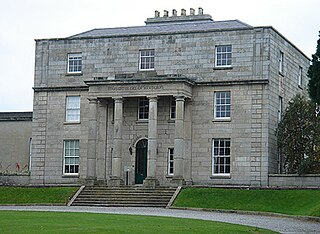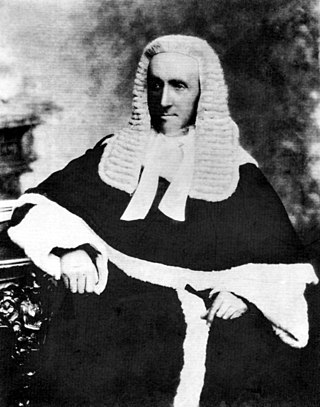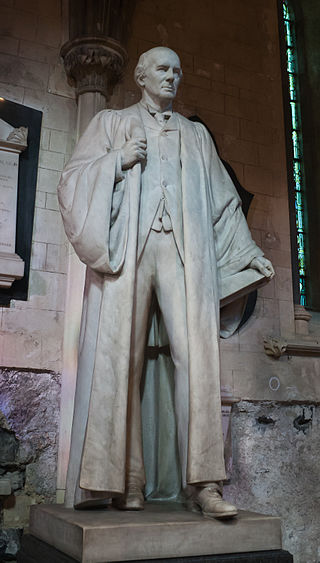Sir Thomas Lopdell O'Shaughnessy, KC was an Irish judge and barrister who served as a Judge of the High Court from 1924 to 1925. He was the last Recorder of Dublin in Ireland.
Dodgson Hamilton Madden was an Irish Unionist Alliance Member of Parliament (MP) in the United Kingdom Parliament. He was also a leading barrister, who held office as Serjeant-at-law, Attorney General for Ireland and subsequently as a judge of the Irish High Court. The Irish Unionists were the Irish wing of the Conservative Party.
Arthur Warren Samuels was an Irish Unionist Alliance Member of Parliament (MP) in the United Kingdom Parliament and subsequently a judge. The Irish Unionists were the Irish wing of the Conservative Party.

Richard Moore PC was an Irish lawyer and judge.

Sir Dunbar Plunket Barton, 1st Baronet PC was an Anglo-Irish British politician, author and judge.
Jonathan Ernest Pim PC (1858–1949), was an Irish lawyer and judge, and Liberal politician.

Sir William Moore Johnson, 1st Baronet, KC, PC was an Irish politician, barrister and judge. He was held in great affection by the Bar, despite a reputation for obtuseness which led to his nickname "Wooden-headed Billy". He was described as "a monument of kindness and stupidity".
Sir John Ross, 1st Baronet, PC (I), KC (1853–1935) was an Irish politician and judge who was the last person to hold the office of Lord Chancellor of Ireland.
John George Gibson PC, QC, was an Irish lawyer, judge and Conservative politician.
Charles Andrew O'Connor, PC, PC(I),SL, KC was an Irish judge who served as a Judge of the Supreme Court from 1924 to 1925. His judgment in a habeas corpus case of R. (Egan) v. Macready is still influential.
This is a list of lawyers who held the rank of serjeant-at-law at the Bar of Ireland.
John Francis Moriarty PC, QC was an Irish lawyer and judge.
Sir James O'Connor, KC PC (I), was an Irish solicitor, barrister and judge. He was appointed Solicitor-General for Ireland in 1914, Attorney-General for Ireland in 1917, and a judge of the Supreme Court of Judicature of Ireland in 1918. After his enforced retirement in 1924, he practised at the English bar until 1929, when he returned to Ireland and was readmitted to practice as a solicitor, a controversial move necessitating a leading judgment on the standard of professional conduct to be expected of a former judge.

Richard Robert Cherry PC, QC was an Irish politician and judge. He was Attorney-General for Ireland from 1905 to 1909, a judge of the Irish Court of Appeal and subsequently Lord Chief Justice of the King's Bench in Ireland 1913–1916. A Liberal, he was elected as the Member of Parliament (MP) for Liverpool Exchange in 1906. Cherry's published works include Lectures on the Growth of Criminal Law in Ancient Communities, 1890, and a book on the Irish Land Acts which was described as an indispensable part of every Irish barrister's library. He was president of the Statistical and Social Inquiry Society of Ireland between 1908 and 1911.

Peter O'Brien, 1st Baron O'Brien, PC, QC, known as Sir Peter O'Brien, Bt, between 1891 and 1900, was an Irish lawyer and judge. He served as Lord Chief Justice of Ireland between 1889 and 1913. In his lifetime he was universally known as Peter the Packer, due to the skill he displayed as Attorney-General in securing verdicts by packed juries.
Sir Walter Boyd, 1st Baronet, was an Irish judge, who was also a member of the Privy Council of Ireland. After serving for many years as the Irish Bankruptcy judge, he was transferred to the King's Bench Division of the High Court of Justice in Ireland. His much younger friend Maurice Healy described him with great respect and affection in his memoir The Old Munster Circuit.
William Drennan Andrews PC (1832–1924) was an Irish judge who served for many years as the Probate Judge. He was the uncle of Sir James Andrews, 1st Baronet, the Lord Chief Justice of Northern Ireland,, J. M. Andrews, Prime Minister of Northern Ireland and Thomas Andrews, architect of the Titanic. There is a sympathetic sketch of his character in The Old Munster Circuit by Maurice Healy. He was a grandson of William Drennan, the United Irishman leader, and his wife Sarah Swanwick.

William O'Brien (1832–1899) was an Irish judge. He is mainly remembered now for presiding at the trials which resulted from the Phoenix Park murders. He was also a noted bibliophile, who created one of Ireland's most valuable collections of antiquarian books.

Gerald FitzGibbon was an Irish barrister and judge, who is regarded as one of the outstanding Irish jurists of his time. He came from a family which produced three generations of eminent lawyers, with the father, son and grandson each bearing the name Gerald FitzGibbon.
Sir John Lyndon was an Irish judge and politician of the seventeenth century. He was the first holder of the office of Third Serjeant-at-law, which was created especially for him, apparently as a "consolation prize" for not being made a High Court judge the first time he sought that office. He was also Recorder of Carrickfergus for many years, a position held by several members of the Lyndon family over the best part of a century.







